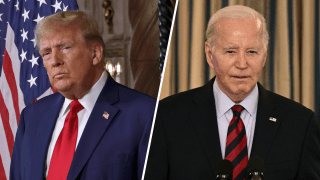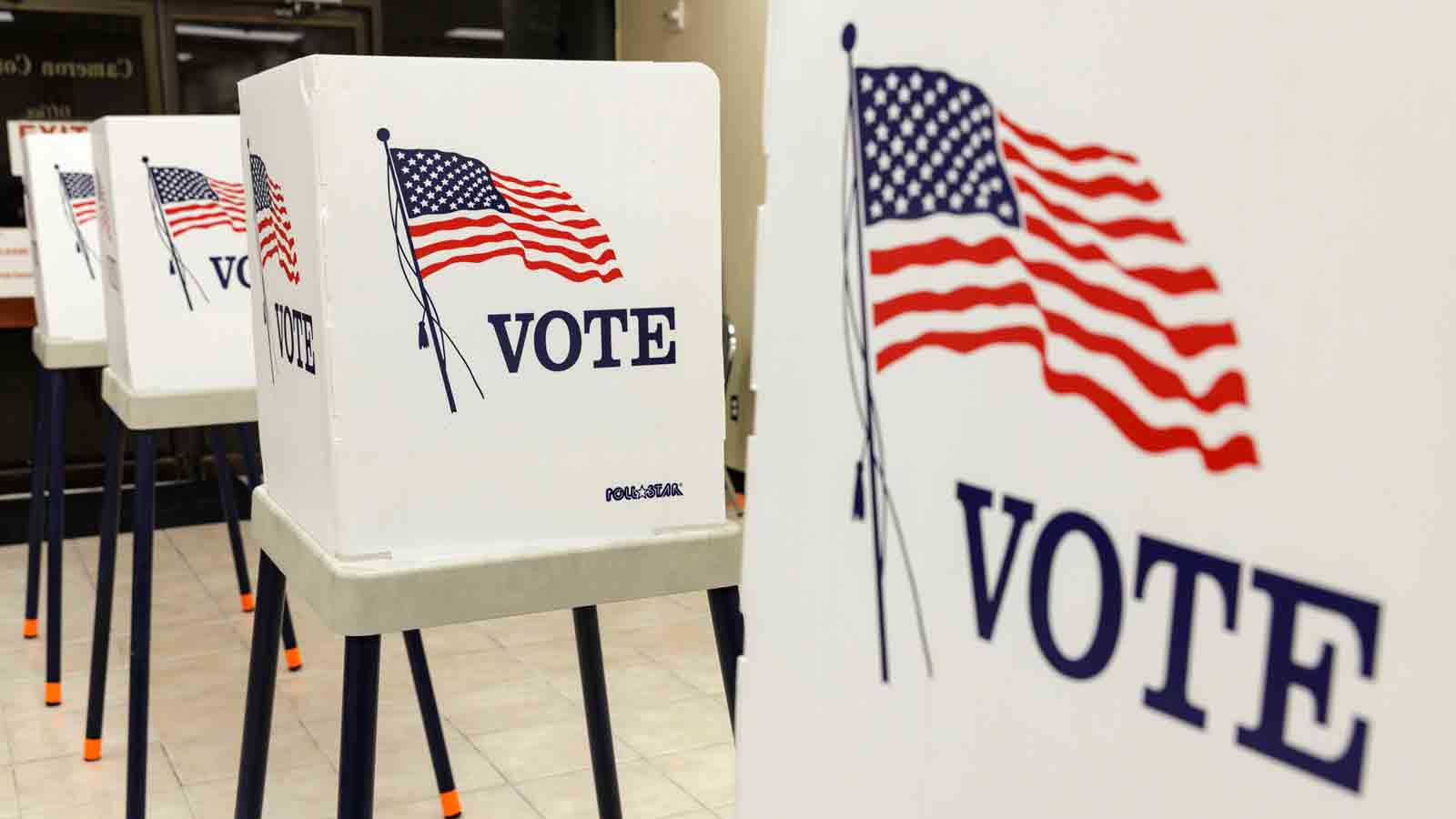
The rematch is on.
President Joe Biden and former President Donald Trump sailed through Super Tuesday primaries Tuesday, racking up enough delegates — in contests held in 16 states and American Samoa — to all but mathematically secure an encore of their 2020 election fight, according to NBC News.
For more than a year, polls have shown Americans anticipating a sequel with the kind of eagerness typically reserved for a drug-free colonoscopy. But Republicans show little interest in stripping their standard from Trump's hands, and Biden, like most modern incumbents, faces no serious competition for his party's nod.
"The 2024 nominations may have unknowingly been locked up since November 2020," Matthew Bartlett, a Republican strategist, said.
"With a former president and an incumbent president, both parties have dug in and are gearing up for a rematch which looks to be vicious, vindictive and possibly vile," he said, noting that the winner would not be eligible to run in 2028. That "will ultimately lead to the oldest ever inaugurated president, who will serve out their lame duck term."
Before Super Tuesday, Haley won only one primary contest — in Washington, D.C., which had one of Trump’s weakest showings in 2016. On Tuesday, Trump piled up wins in races across the country: California, North Carolina, Virginia, Tennessee, Oklahoma, Texas, Arkansas, Maine, Alabama, Massachusetts, Colorado and Minnesota.
Get Tri-state area news delivered to your inbox. Sign up for NBC New York's News Headlines newsletter.
NBC News called Vermont for Haley, leaving the tally of states at 12 for Trump and one for her.
Addressing supporters at his Mar-a-Lago club, Trump ignored Haley entirely as he laid out general election themes: blaming Biden for wars in Ukraine and the Middle East, inflation and illegal immigration.
"He's the worst president in the history of our country," Trump asserted. "Nov. 5 is going to go down as the single most important day in our history. ... Right now our country is known as a joke."
Biden chose not to speak publicly, releasing a statement that similarly pointed to the stakes of the November election.
"Tonight’s results leave the American people with a clear choice: Are we going to keep moving forward or will we allow Donald Trump to drag us backwards into the chaos, division, and darkness that defined his term in office?" Biden said in the statement.
He noted that wages are rising faster than inflation, took credit for the addition of 15 million jobs during his term and alluded to his lowering of prices for certain prescription drugs.
"If Donald Trump returns to the White House, all of this progress is at risk," he said.
NBC News exit polls in Virginia and North Carolina showed Trump running up the score against Haley among self-identified conservatives, evangelicals and white voters who did not graduate from college — winning three-quarters or more of each of those groups in Virginia and more than 80 percent of them in North Carolina.
In what has become a familiar pattern, Haley fared better with self-identified moderates, who gave her 66 percent of their votes in Virginia and 62 percent in North Carolina. Her success with that smaller set of Republicans has raised questions about whether Trump can keep them in the GOP camp for the general election.
Neither Trump nor Biden can afford to lose many of their own party's voters in November, and there are reasons for Democrats to worry about the president's position even as Biden swept the primary map Tuesday with wins in California, Iowa, Virginia, North Carolina, Vermont, Oklahoma, Tennessee, Massachusetts, Maine, Arkansas, Texas, Alabama, Colorado and Minnesota. (The one contest he lost was the small caucus in American Samoa.)
Recent polls show a tight race between Trump and Biden in the national popular vote. But given Biden's narrow electoral-vote margin in 2020 — he won by about 43,000 votes spread over three states, even though he led Trump by 4.5 percentage points in popular votes — some Democrats worry that his advantage has disappeared.
Their fears were underscored last week when Bloomberg News and the Morning Consult released a battery of swing state polls showing Trump ahead of Biden in each of the key battlegrounds that are expected to collectively determine the winner.
"Biden starts in a clear deficit in nearly every battleground state and nationally," said Chris Kofinis, a Democratic strategist who has worked on multiple presidential campaigns.
"Here is the brutal reality: The strategy Biden and Democrats have deployed to weaken Trump is simply not working, and it's clear there needs to be real course correction both in terms of the message and the strategy," Kofinis said. "Betting on a Trump implosion is not a strategy, and [Trump primary rival] Nikki Haley is going to find that out."
There are signs Biden wants to alter his trajectory. He recently moved Jennifer O'Malley Dillon from her perch as a deputy chief of staff in the White House to his campaign. She has not reclaimed her 2020 title — "campaign manager" — but Democrats say they expect her to bring a steadying hand and the confidence of the president to the operation. Biden's longtime political right hand, Mike Donilon, has also decamped from the White House to the campaign.
“Super Tuesday will help solidify the choice facing voters in November between Donald Trump’s dangerous chaos and Joe Biden’s fight for freedom, democracy and our fundamental rights as Americans," Biden campaign spokeswoman Lauren Hitt said before the results were in Tuesday. "Donald Trump is running a campaign of revenge and retribution, to protect himself and enrich his wealthy friends. President Biden is running to finish the job and build on his work lowering prescription drug prices, protecting reproductive rights, and creating good paying jobs in an economy that works for middle class families.”
Some strategists in both parties have been surprised by Trump's political resilience. Twice impeached by the House, Trump has been indicted in four separate cases in federal and state courts since leaving office and recently lost a civil judgment against his business that figures to cost him nearly half a billion dollars.
But his legal troubles made him demonstrably more popular with Republican voters as he portrayed himself as a victim of persecution by prosecution. A field of Republican challengers that included Haley, two-term Florida Gov. Ron DeSantis, North Dakota Gov. Doug Burgum, South Carolina Sen. Tim Scott, former New Jersey Gov. Chris Christie and others decompensated amid a GOP rally around its two-time nominee.
Trump entered Tuesday with a 276-to-43 lead over Haley, his lone remaining rival, in NBC News' count of delegates to this summer's Republican National Convention. With 865 delegates available — more than a third of the overall number headed to the convention — Trump will end the night short of the 1,215-delegate threshold that constitutes a majority. But he is expected to draw close enough that many Republicans view Haley as an afterthought.
The Trump campaign, which is set to hold a large fundraising event Wednesday in Washington featuring GOP congressional leaders and headlined by Donald Trump Jr., has been pressing Republicans to bring the primary to a close for several weeks.
"Republican voters have delivered resounding wins for President Trump ... and this race is over," Trump campaign spokeswoman Karoline Leavitt said. "Our focus is now on Joe Biden and the general election."
The biggest delegate purses for both parties were in California and Texas, which Trump and Biden won handily. Biden still faces nominal opposition from Rep. Dean Phillips of Minnesota, who has failed to gain traction — or win any delegates — in early states on the calendar. NBC News' tracker showed Biden with 206 delegates going into Tuesday and more than 1,000 by the end of the night.
Biden was denied two delegates last month in Michigan. They were won by a ballot line for "uncommitted" that progressive voters used to register displeasure with his support for Israel in the war in the Middle East. With NBC News projecting a victory for Jason Palmer in American Samoa — with six delegates in the balance — Biden figured to lose a handful more Tuesday night.
Like his recent predecessors, including Trump, Biden has found the presidency to be a drag on his popularity. A February Gallup survey found his approval rating at 38 percent. He hasn't been above 50 percent in Gallup polling since June 2021.
Trump's approval rating fell to 34 percent in his final month in the Oval Office as he tried to overturn the results of the 2020 election and his supporters stormed the Capitol to try to stop the certification of Biden's victory. Trump's approval never topped 49 percent in Gallup polling.
This story originally appeared on NBCNews.com. Read more from NBC News:



